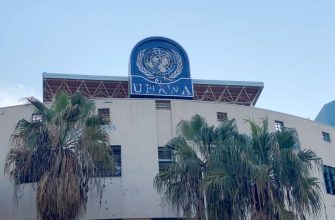The police in Malmö have extensive experience in handling larger events, even under the new security situation prevailing in Sweden. In mid-August, just a couple of weeks after the Security Police raised the threat level to a four on a five-point scale, the Malmö festival drew hundreds of thousands of visitors.
In the middle of the festival, a warning, a rumor, spread. “Something†would happen, it was said with reference to a diffuse source who would work within the police. The rumor spread quickly, says police spokesperson Nils Norling.
– It created an incredibly great fear among people who moved around in central Malmö. There was an enormous amount of pressure on the city of Malmö and on our staff who worked. People were terrified. is it safe for me to be here? Can I let my children go to a concert?
– But the police were able to quickly establish that the rumor was completely unfounded, says Nils Norling.
Soon one is waiting significantly larger and significantly more charged event in Malmö. Despite major protests, Israel was allowed to participate in Eurovision at the same time as the war in Gaza continues. It has aroused strong feelings and the protests during Eurovision week are expected to be massive. This at the same time as the security situation in Sweden and large parts of the world is more serious than in many years.
Many are afraid that demonstrations will derail, or that something even worse will happen. In a clip from Israeli television, from a report that paints Malmö as a violent city with a large Muslim population where Jews live dangerously, an unknown person warns the TV crew and says that there will be a bomb during the week.
Brian Palmer is a social anthropologist and lecturer, active at, among others, Uppsala University. He believes that those who initiate a rumor may certainly have a malicious intent to harm, but this need not apply to those who spread the rumor.
– Those who forward the rumours, usually on social media, may feel that they are doing something important. That they warn of a danger or publish some important truth that has been censored in some way.
According to Brian Palmer, rumors tend to have particular impact when they reflect people’s concerns, fears and needs.
– Rumors often occur in times of uncertainty or major social change. And I mean that, for example, leading politicians have a great responsibility not to give more nourishment than necessary to our fear by exaggerating dangers or threats.
According to the organizers there are there are no concrete threats to Eurovision in Malmö. But all the focus on security issues, threats and the risk of conflict still affects people. It makes us afraid.
– It is very difficult not to be influenced by such discussions. We have an evolutionary, human tendency to take threats very seriously, to be on our guard. But then it is important to reflect on whether it is a well-founded fear based on concrete danger, or a feeling that comes from other factors.
A hub for spreading rumors that the Malmö Police focus a lot on before Eurovision is social media.
– We expect that baseless rumors will be spread. It can be about people who want to be scared, who want to joke or people who actually don’t know any better. Those who actually think they are doing others a favor by spreading these rumours, says Nils Norling.
The consequences can be serious, he believes. The rumors make us afraid.
– It can, I mean, have quite serious consequences. It can make people let fear win and that is the absolute worst thing we can do, to let fear win.
At the same time as the threat level has been raised, the population has been urged to continue living their lives as usual. But to be attentive. This includes dealing with concerns in a responsible way and the question you have to ask yourself is, according to Nils Norling, whether it does more harm than good to spread a warning that you r not sure if it is correct.
– To simplify it: if you see something that does not seem normal, contact the police. Don’t post about it on social media. That’s how rumors arise. Many people have problems with source criticism.
Facts.This is how you are critical of rumours:
Beware: Be vigilant and question information and images that may upset, frighten or arouse strong feelings.
Think: Don’t become part of spreading rumors or misinformation. Think before you share, even if it’s just to friends.
Check the source: Be critical of the source. It’s easy to get carried away when the rumor is going around, but try to remember to step back and assess the plausibility of what’s being spread and what the source is r sender. Is the information reasonable? Can it be double checked? Why would an unknown account, and not authorities, have information about an impending act of violence? And why would you spread it 12 hours after it was published?
Search for confirmed info: Listen to information from the authorities and stay updated. Regarding information about threats or impending violence, you can always contact the police on 114 14, or phone number 112 if the situation is urgent.
Source: The authority for psychological defense and the police







